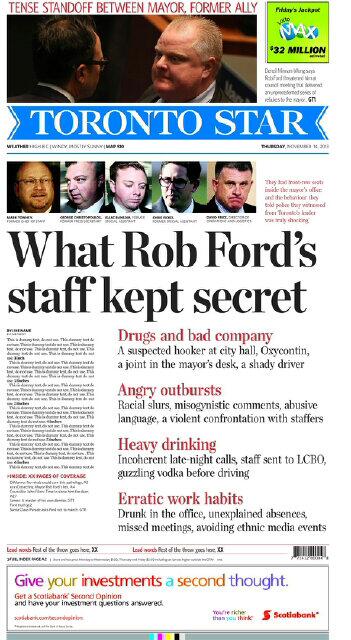
There's not much surprising left in Rob Ford's story; unless he's directly tied to a murder or dies himself, people have more or less accepted the Mayor for what he is - a sick man in an environment that is entirely unhealthy for him. Any other offense that emerges is just more of the same.
Which may be why the Toronto Star appears to be looking for fresh material by focusing on Ford's staff.
There are a lot of egregious misdeeds that Ford's staff covered up (or didn't proactively report to other authorities). Staff appear to have, on some occasions, put themselves at personal risk on the Mayor's behalf, too. There are also a lot of "other duties as necessary chores like household chores that are not only beyond the scope of their job description, but entirely inappropriate for an elected official to ask of a paid employee.
The question is - why? Why would young staff do things they should know were unethical and should instinctively had avoided?
The answer is an issue I've been trying to raise for quite some time now about the toxicity of general political culture.
A lot of political staff are young - sometimes, fresh out of school or in the case of many Ford staffers, connected to him through school. It's not unusual for newbie staff to have no work experience beyond politics In short, there first real-world exposure to work and work practices is through political offices, where they might very well stay for the majority of their careers.
There are no clear job descriptions for political staff, nor are there protocols. Particularly at the partisan, level, staff never have a clear sense of who they are ultimately responsible to - Parliament, the Party or the Elected Official? As the internal culture is all about enabling the boss so that they can keep winning elections, it's almost sanctioned for staff to cover up on behalf of the boss (see Senate Scandal).
Staff know where their bread is buttered; knowing full well that their Member is accountable to no one expect occasionally their Party and it's in the Party's electoral interest to keep any bad behaviour under wraps, is it irrational to expect them to do what it takes to keep their jobs and the networking, free booze and brand-opportunities that come with it? So what if that means sorting out a parking ticket on the boss' behalf - after all, that's simply the way the game gets played.
Who do staff look to for examples of what is and isn't acceptable work culture? Other staff. Who did those staff learn from? Exactly. As there are no enforced internal accountability mechanisms, no training programs, no Human Resource departments and enough swag to offset the occasional abuse they take, staff develop a political trench mentality that accepts as normal all kinds of behaviours that are theoretically unacceptable in civil society.
The same, by the way, holds true for politicians. Their job is to win, and so long as they do that and their Party does well, everything else is secondary - including their training or skills/personality appropriateness for the job.
We can go on focusing on blame, suggesting that it's up to these staffers to intuitively buck the system and act in a transparent, ethical fashion. Truth is, those that do tend to face consequences. Human beings are creatures of culture and in a toxic culture, one expects to work with poison. There is no better example of presenteeism than in political offices, which goes a long way to explaining our overall democratic deficit.
There are some politicians who are excellent employers. There are excellent politicians that make for poor employers. As always, most people fall somewhere in the middle. Rob Ford seems to inhabit both poles at once - he puts his staff in uncomfortable positions, but also gives them game tickets. The two behaviours are not unconnected.
I don't have much time for blame, because it's ineffective; I'm a problem-solver, not a finger-pointer. The whole Rob Ford saga is a canary in the coal mine, putting in relief some of the structural issues that allowed for this sad state of affairs to be realized at all. We won't solve the problem by replacing the people; it's the culture and supportive structure that needs to change.
There are better ways to train, support and empower political staff to be part of the solution rather than enablers of the problem. Thing is, such change takes leaders willing to break the mold and heal a fractured, if self-serving, system.
Should any leader muster such courage, the results would most definitely be news worthy.

No comments:
Post a Comment